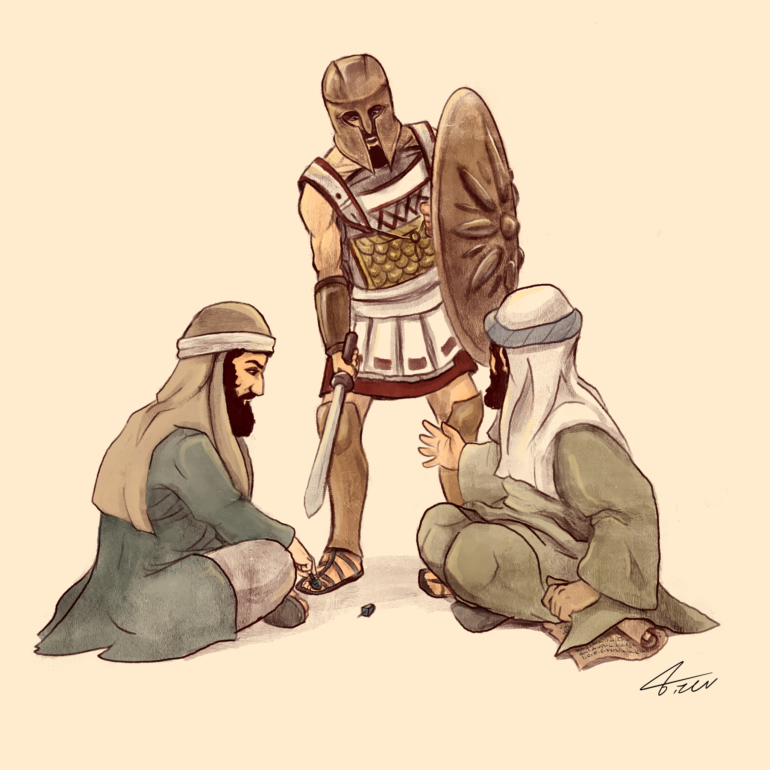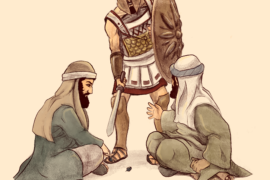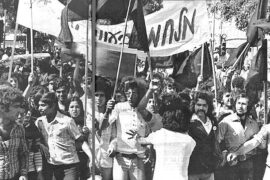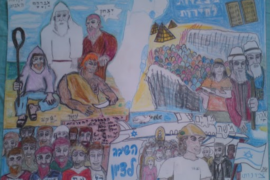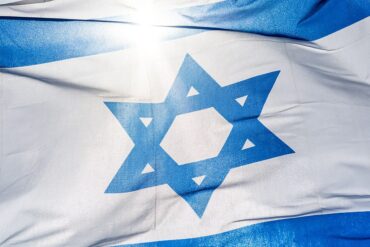The first chapter of a podcast series on the first Book of Maccabees.
For more content from VISION Magazine, subscribe to our newsletter and follow us on Twitter @VISION_Mag_, Facebook and YouTube. If you haven’t already, don’t forget to subscribe to our podcast on SoundCloud, iTunes, Stitcher, TuneIn, or Spotify and leave a rating and review to help us get our message out to a wider audience!
To support the podcast, head over to our PayPal portal and be sure to write a note that your contribution is for the podcast.
Hosted by: Robert Goodman
Transcript:
Shalom Aleikhem and welcome to the Book of Maccabees, chapter one!
In the previous recording we introduced the Book of Maccabees and went through a quick overview of Jewish history from the Exodus from Egypt until the Greek Empire. The Greeks, by the way, are the third of the four empires that work throughout history as the enemies of Am Yisrael. In Sefer Daniel chapter 7, Daniel has a vision of four beasts that represent the four exiles in Jewish history: the first, a winged lion, represents Bavel, the second, a bear, Persia, the third, a winged, four-headed leopard, Greece, and the fourth, a terrifying, awesome beast with ten horns, Rome. In this series we’ll be primarily focusing on Greece, of course, but we’ll also be mentioning Rome and explaining how it plays a role in the story of the Maccabees.
The first chapter begins at the time of Alexander the Great, who has been ruling his vast empire for twelve years, but then he falls ill, and he realises that he’ll soon die. So he calls his generals, and divides his empire among them while he is still alive. So when Alexander passes away aged 32, the once united Greek Empire splits into 3 separate entities each controlled by his former generals: Seleucid Greece, based in Syria, Ptolemaic Greece, based in Egypt, and Macedonian Greece, which was based in Greece itself and included Athens, Sparta and the like. Judea initially falls under Ptolemaic rule.
As we mentioned previously, even after Alexander’s death the Jews are allowed to keep living as themselves for more than a hundred years before the trouble really starts. But even during this time of relative peace there were some troublesome developments within the Jewish population. Two talmidim of the Gadol HaDor, Antignos of Sokho, break away from the central authority of the Sanhedrin and establish Jewish splinter sects. These breakaway groups, the Tzdukim and the Bytussim, are named after their founders, the students Tzadok and Bytus. The Tzdukim and Bytussim reject the authority of the Torah Sh’baal Pe and insist the Torah only has to be interpreted literally. They in turn are rejected by the rest of the Jews who remain loyal to the Torah and our chain of mesora. So while the Jews are tolerated and even admired by their Greek rulers, they themselves are becoming increasingly divided.
One of the main events that takes place during this time period include Ptolemy the third having the Torah translated into Greek by seventy two Rabbis – the Septuagint translation – as related in G’mara Megilla 9a, not a good event for the Jews as this opened the door for non-Jews to misinterpret and mistranslate the Torah, as would happen in later centuries.
After Judea has been ruled by Ptolemaic Greece for 108 years, a key battle known as the battle of Panias takes place in northern Judea between the Ptolemies and the Seleucids; the Seleucids win and as a result they gain control of Judea, led by King Antiochus III, a descendent of the generals of Alexander the Great between whom he divided his empire. Following their conquest of Judea the Seleucids rule the province from their capital city Antioch, located further north up the Mediterranean coast, not too far from modern day Turkey. However, the Seleucid control of the region is not secure. Why? Two reasons: firstly, the Ptolemians are not happy about their defeat and are constantly trying to take Judea back from the Seleucids, and secondly, the power of Rome is rising in the West and becoming a very real threat to the dominion of the Greek empire, which by this time is starting to stagnate. Both these things make Antiochus III and later his son, Antiochus IV Epiphanes, very insecure about their rule over the region, and they are desperate to hold onto control. Something has to be done to fix the situation.
Before we go any further, we have to consider the on-the-ground realities in Judea at the time. A verse in the book’s first chapter reads: “In those days went there out of Israel wicked men, who persuaded many, saying, ‘Let us go and make a covenant with the non-Jews that are round about us, for since we departed from them we have had much sorrow.’”
The verse is referring to the Hellenized Jews, the mityavnim, a small but very vocal and very powerful group of upper-class Jews who had been seduced by Greek culture. They wanted to become Greeks and there was nothing they would sacrifice to achieve this, their ancient Jewish rituals first of all – they abandon Torah and mitzvah observance, they send their children to the Greek gymnasium and they undergo painful surgery to reverse their brit mila. They approach King Antiochus Epiphanes who grants them permission to build a gymnasium in Jerusalem, where Jews can run races naked and do shot-put within sight of the Beit HaMikdash itself; with the result that Jerusalem becomes less HaShem’s holy city and more an outpost of Greek civilization. These Hellenized Jews ally themselves with the Greek authorities and are very angry with their fellow Jews for remaining loyal to Torah and not marching forward into this new “enlightened, progressive culture.”
Things start to get really bad for the Jews once Antiochus goes on a campaign to capture Egypt from the Ptolemians and is partially successful, but when he goes back a second time to finish the job he is blocked by a Roman messenger who presents him with an ultimatum from the Roman Senate: either withdraw your armies from Egypt or consider yourself at war with Rome. Enraged, but left with no choice, Antiochus withdraws, and on the return trip back to Syria, which takes him through Judea, he does something shocking, as the text tells us in verses 22-24:
״ויבוא בעזות מצח אל הקודש פנימה, ויקח את מזבח הזהב ואת המנורה ואת כל כליה, ואת שולחן הפנים ואת קערותיו ואת כפותיו, ואת המזרקות ואת פרוכת המסך ואת הכותרות, וכל עדי הזהב אשר לפני ההיכל, ויקצץ אותם״
“And he entered proudly into the sanctuary, and took away the golden altar, and the candlestick of light, and all the vessels thereof, And the table of the showbread, and the pouring vessels, and the vials, and the censers of gold, and the veil, and the crown, and the golden ornaments that were before the temple, all which he pulled off. He took also the silver and the gold, and the precious vessels; also he took the hidden treasures which he found.”
So Antiochus loots the Beit HaMikdash and returns to Syria feeling rather smug. Needless to say, all the Jews are shocked to the core and are left in a state of national mourning. The Beit HaMikdash has been stripped of the Shulḥan, the Menora and the golden altar which had been with the people since the time of Moshe Rabbeinu in the Sinai Desert, as well as the other precious vessels and treasures in its storehouses.
What the text doesn’t tell us explicitly is that Antiochus didn’t act of his own initiative. A Hellenized Jew named Menelaus, who hailed from the tribe of Binyamin, had approached Antiochus and said, “If you appoint me as the Kohen Gadol, I will empty the treasury of the Beit HaMikdash and give it all to you as a bribe.”
Antiochus is thrilled, because he needs this money to finance his wars against the growing threat of Rome, so he dismissing the legitimate Kohen Gadol, a Jew named Yoḥanan, and installs Menelaus in his place. Then as we’ve seen, he collects the money promised to him when he empties the treasury of the money which should have been used for buying korbanot, and takes it all back to Antioch. The Book of Maccabees paints Antiochus as the primary antagonist in the story, but while he’s far from innocent we must know it was actually the Jews themselves who instigated the Greek oppression. This fact may sound shocking at first but after a while, not so much.
Not content to leave well enough alone, two years later Antiochus sends his chief tax collector to Jerusalem with a great army, who at first act friendly towards the Jews, but proceed to massacre many of the inhabitants, and lead the women and children into slavery.
What happens next is an important detail that’s going to have repercussions throughout our entire story, but one that few people who haven’t learned the story are aware of. Verse 35 reads:
“ויבצר את עיר דוד בחומות גבוהות ומגדלים, ותהי להם למצודה”
“And they built the city of David with a great and strong wall, and with mighty towers, and made it a stronghold for them.”
The Greeks build a metzuda, a huge fortified tower, in the city of David, which is just south of Har HaBayit. (This tower became known as the Acra.) Once complete the Greeks fill this tower with food supplies, weapons, armor and many of the treasures they stole from Jerusalem, and the Acra becomes the primary base camp for the Seleucid mercenaries and Hellenist Jews in Jerusalem. The mercenaries use it as a launch pad to carry out numerous attacks against the inhabitants of the city. [Although at the time of the Maccabees the Kotel had not yet been built (it was constructed 100 years later by Herod the Great), try to imagine walking through the old city of Jerusalem and approaching the Temple Mount from the direction of the Kotel and seeing the Beit HaMikdash standing proudly atop, but just to the right you see a huge, ugly tower filled with dirty Greek mercenaries and sneering Hellenist Jews, who venture forth from their well-stocked tower to slaughter the Jews who live in the surrounding neighborhoods. That’s roughly what it was like in Yerushalayim around that time.] The situation becomes untenable and the God-fearing Jews living there begin fleeing Yerushalayim en masse, until it’s virtually empty of all but Greek mercenaries and Hellenist Jews.
Now the text tells us about the infamous decrees of forced Hellenization Antiochus Epiphanes brought upon the Jews. Despite no longer believing in the gods of Olympus (as both Aristotle and Plato did not) the Greeks recognized this religious dogma as being an important tool to unify their empire and wanted all conquered peoples to adopt their Greek culture and pay lip service to the gods that came with it. As we mentioned in the introduction, most peoples conquered by the Greeks willingly allowed themselves to become Hellenized, including a chunk of the Jewish population, but since the mainstream Jewish population did not go along with this Antiochus took matters into his own hands to turn the country of the Jews into a thoroughly Greek province.
Firstly, Antiochus outlaws the Hebrew calendar, forbidding anyone to keep Shabbat, Rosh Ḥodesh or any of the ḥaggim. Next he forbids keeping kosher and studying Torah, and sifrei Torah throughout the country are burned in public gatherings. Altars to the Olympian gods are set up all over the country, and Jews were forced to sacrifice pigs upon these pagan altars. Antiochus also forbids brit mila, because the Greeks, who worshiped the perfection of the physical body, saw mila as nothing less than a gross mutilation of the human body. All these decrees were enforced under penalty of death.
These are the more well-known decrees Antiochus instituted, but Greek persecution of the Jews was not only limited to attacking Torah and mitzvot. During this period of escalating persecution, which is described as a “reign of terror,” there featured the domination of Judean markets by the Greeks; also the infamous prima nocta laws, which meant that a Jewish bride, before being intimate with her husband for the first time was required to spend a night with the local Greek general, thereby corrupting the family purity and modesty towards marital relations which for so long had been and still is an inseparable hallmark of the Jewish people.
And of course Antiochus outlaws the avoda, the service in the Beit HaMikdash, discontinuing the korbanot and doing all he can to defile the Beit HaMikdash and turn it into a pagan sanctuary. The site is dirtied and strewn with pigs’ blood and flesh, and a huge statue of Zeus is set up there, turning the site of HaShem’s sh’khina into a dump. On the twenty fifth of Kislev, the Greeks sacrifice on their pagan altar, which they built directly atop the copper mizbe’aḥ (the date, as I’m sure you realize, is not arbitrary; we’ll take a deeper look at its significance later on).
As mentioned above, all these decrees are enforced under penalty of death, and since many Jews resist, Antiochus and his sidekick Menelaus, the Hellenized Kohen Gadol, embark on what is described as a “reign of terror” to drive the decrees home in a vicious and uncompromising manner. The second Book of Maccabees describes how two women who were caught giving their sons a brit mila had their sons tied round their necks, were marched through the city and pushed off the city wall. Rabbi Berel Wein describes in his book Echoes of Glory how: “the scholars of Israel were hounded, hunted down, and killed. Jews who refused to eat pork or sacrifice hogs were tortured to death… Even the smallest hamlet in Judea was not safe from the oppression of the Hellenists. The altars to Zeus and other pagan deities were erected in every village, and Jews of every area were forced to participate in the sacrificial services.”
Also occurring during this reign of terror which lasted two years, is the story of Ḥana and her seven sons, who were imprisoned by the Greek authorities. From eldest to youngest, one by one Ḥana’s sons are tortured to death in gruesome when each son refuses to eat pig meat or bow to the Greek gods, showing immense inner strength and emuna in HaShem. After her last son is slaughtered, Ḥana throws herself off a rooftop. For anyone who would like to read the story in full, it’s described in chapter 7 of the second Book of Maccabees, accessible on Sefaria. It’s not a pleasant read, but it’s utterly inspiring.
The last verse in our chapter describes the situation best:
“ישראל כל על גדול קצף ויהי”
“And there was very great wrath upon Israel.”
We are at the receiving end of the fiercest religious persecution the world has ever seen until this time. Something I learned from Rabbi Moshe Taragin of Yeshivat Har Etzion is that the nations who fought against us before this time, for example Aram, Ashur, Bavel, all fought us hard, but their motives for conquest were territorial, not ideological; because we owned land they wanted to get their hands on. Not until the days of Haman does ideological antiSemitism begin to appear, when we are persecuted purely for being Jews. And the Greeks employed it in a whole new kind of way.
Needless to say, the situation can’t hold. Some Jews take the path of “passive resistance” – ignoring the decrees and continuing to be shomer Torah u’mitzvot – but this proves fatal, as the Greeks continue to hunt these Jews down and slaughter them. The Jewish resistance then takes on a more active form, and eventually erupts into an open revolt against the Greek forces and their Hellenized Jewish allies. Just how exactly this happens, we shall see in the next chapter.

